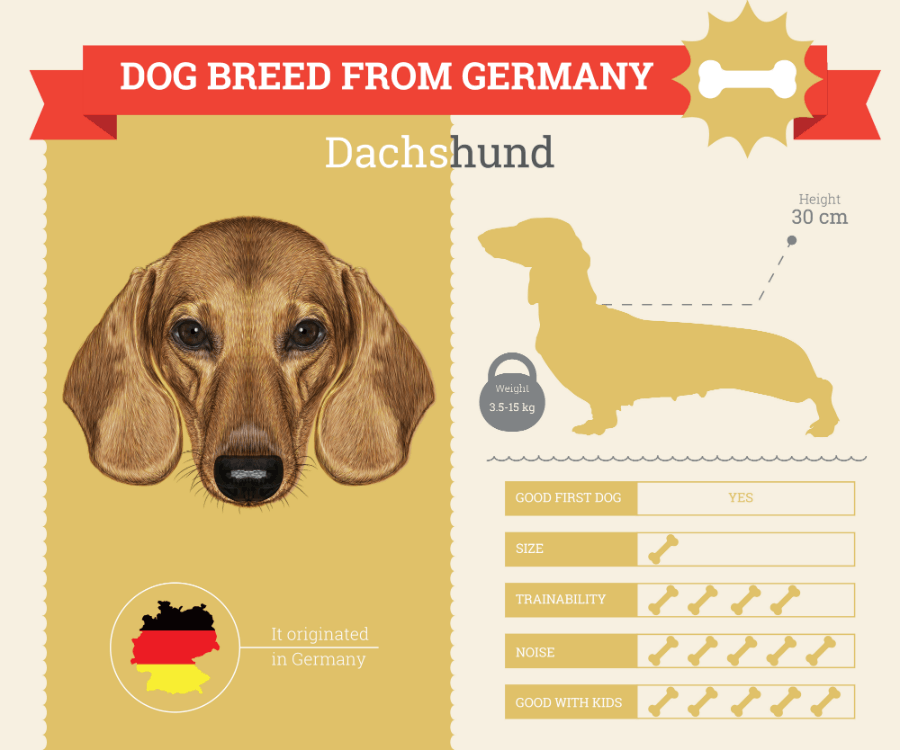Dachshunds are scent hound dogs that were bred to hunt badgers, rabbits, and foxes. Dachshund groups were even used by hunters to track wild pigs. Their flexibility makes them excellent family dogs, show dogs, and small-game hunters today.
But don't let this puppy deceive you. This diminutive, drop-eared dog may be "half a dog high and a dog and a half long," as noted literary critic and humorous writer H. L. Mencken put it, but it is tough enough to take on a badger. They got their names from this (Dachs means badger and hund means dog). You could know them as Wiener Dog, Sausage Dog, Doxie, or another of their many nicknames.
Introduction
The Dachshund, often known as a "wiener dog," is a breed that dog enthusiasts all over the world adore. Because of its distinct appearance and energetic demeanor, it is a popular family pet. In this essay, we will discuss the Dachshund's history, characteristics, training, care, and cultural significance.
History
The Dachshund was developed in Germany as a hunting dog. In German, their name means "badger dog," referring to the fact that they used to hunt and track small animals, particularly badgers.
Dachshund differences: The Dachshund breed comprises dogs with smooth, longhaired, and wirehaired coats. These various coat styles provide potential owners with options while preserving the breed's distinctive characteristics.
Characteristics
They are easily identified by their long body, short legs, and long snout. Their coats might be smooth, longhaired, or wiry, adding to their individual charm.
Characteristics: They are recognized for their vigour and bravery. Despite their diminutive size, they have a strong sense of resolve and are generally noted for their bravery.
Characteristics: These dogs are recognized for being devoted to their owners. They may be wary of strangers, which makes them excellent watchdogs.
Dachshunds are available in two sizes: standard and miniature. A typical Dachshund weighs between 16 and 32 pounds (7 to 15 kg), and a miniature Dachshund weighs 11 pounds (5 kg) or less.
Lifespan: They typically survive 12 to 16 years, but with proper care, some can live even longer.
Socialization and education
Early Training and Socialization: They require early training and socialization to avoid behavioral problems and to get along well with people and other animals.
Positive reinforcement training, in which the dog is rewarded with goodies and praise for good behavior, is an effective method for training a Dachshund. Patience and constancy are essential.
Common behavioral issues and how to cope with them:
Because they are so attached to their owners, they often become anxious when they are separated from them. Crate training, gradually increasing the dog's alone time, and providing exciting toys can all help to solve this problem.
Maintenance and upkeep
Common Diseases and Symptoms: Because of their length, they are more prone to back problems, which can lead to intervertebral disc disease. Obesity can exacerbate these issues.
Dietary requirements: They require a well-balanced diet to keep healthy and at the proper weight. It is preferable to feed your dog a limited amount of high-quality food.
Exercise Requirements: Regular exercise is essential for preventing obesity and improving overall health. However, they should avoid excessive jumping and activities that are harmful to their backs.
Grooming and Hygiene: Different Dachshund coats require different grooming. Its with smooth coats do not require much maintenance, while those with long or wire hair should be combed on a regular basis.
Breeding and reproduction: Ethical breeding is all about selecting healthy partners to breed with in order to keep inherited health concerns to a minimal. Good breeders are concerned with the health of both the parents and the puppies.
Where to buy and adopt: It is advisable to go to recognized breeders who care about the qualities and health of the breed. Another nice thing to do is to adopt from shelters and rescue organizations.
Media Coverage of the Dachshund
One of the most well-known Dachshunds is "Sausage," the beloved pet of former US President John F. Kennedy.
The Dachshund has appeared in many films and television shows, usually as faithful and charming creatures.
Representation in the Media: The Dachshund's distinct appearance and energetic demeanor are frequently shown in various forms of media, demonstrating how they truly are.
Conclusion
Finally, the Dachshund's popularity can be explained by its distinct appearance, vibrant nature, and unwavering loyalty. They are a terrific addition to families of all sizes because they used to be good hunters and are amiable. The Dachshund continues to live up to its reputation as a vivacious companion with the proper training, care, and breeding.
source https://dogcareguidetip.blogspot.com/2023/09/dachshund-dog-breeds-temperament.html

Post a Comment